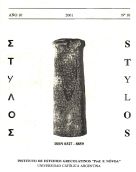Por favor, use este identificador para citar o enlazar este ítem:
https://repositorio.uca.edu.ar/handle/123456789/4202| Campo DC | Valor | Lengua/Idioma |
|---|---|---|
| dc.contributor.author | Suárez Pallasá, Aquilino | es |
| dc.date.accessioned | 2019-06-01T18:20:24Z | - |
| dc.date.available | 2019-06-01T18:20:24Z | - |
| dc.date.issued | 2005 | - |
| dc.identifier.citation | Suárez Pallasá, Aquilino. “Sobre el Flegetânîs del libro IX de Parzival de Wolfram von Eschenbach”. [en línea], St ylos, 14 (2005). Disponible en: https://repositorio.uca.edu.ar/handle/123456789/4202 | es |
| dc.identifier.issn | 0327-8859 | - |
| dc.identifier.uri | https://repositorio.uca.edu.ar/handle/123456789/4202 | - |
| dc.description.abstract | Resumen: La fmaliciad de este estudio es establecer el sentido verdadero de un pasaje del Libro IX del Parzival de Wolfram von Eschenbach, mal interpretado hasta ahora por sus comentaristas y por el primer traductor castellano. Se demuestra, pues, que el origen del personaje Flegetanis no es árabe, sino gentil -seguramente caldeo o persa corno los Reyes Magos- por parte de padre y hebreo por parte de madre, y que su escritura no es árabe; luego, que su nombre deriva del del río Phlegethon de la tradición grecorromana; además, que la ida y vuelta de las estrellas que ha sabido describir consiste en el ciclo de la precesión de los equinoccios; en fm, que la ciencia puramente humana de Flegetanis es insuficiente para comprender la más alta maravilla del universo -el Grial- sin el auxilio de la gracia que procede del agua del bautismo. | es |
| dc.description.abstract | Abstract: lt is my airo, in writing the present paper, to establish the genuine sense of a difficult passage from Book IX of Parzivalby Wol:frarn von Eschenbach, which passage was until now rnisunderstood by its interpreters, and by the fJISt Castillian translator of Wolfram's work too. 1therefore establish that the character called Flegetfulls has no Arabic origin, but gentile or pagan -certainly Chaldean or Persian like the Magi- as to bis father, and Hebrew as to bis mother, so that his writing can not be in the Arabic tongue. 1establish also that his name comes from Phlegethon's, one of the four streams of Hades in classical tradition; 1 establish besides this that the corning and going cycles of the stars descript by Flegetanis consíst in the precession of equinoxes; and 1 establish finalIy that Flegetanis's purely human science is not capable of tmderstanding the'highest rnarvel in the universe -the Grial-, without being helped by faith and the grace prpceeding from the water ofbaptism. | es |
| dc.format | application/pdf | es |
| dc.language.iso | spa | es |
| dc.publisher | Universidad Católica Argentina. Facultad de Filosofía y Letras. Instituto de estudios grecolatinos "Prof. F. Nóvoa" | es |
| dc.rights | Acceso Abierto | es |
| dc.rights.uri | https://creativecommons.org/licenses/by-nc-sa/4.0/ | es |
| dc.source | Stylos Nº 14, 2005 | es |
| dc.subject | Wolfram, von Eschenbach | es |
| dc.subject | LITERATURA MEDIEVAL | es |
| dc.subject | LITERATURA ALEMANA | es |
| dc.subject | ANALISIS TEXTUAL | es |
| dc.subject | TRADUCCION | es |
| dc.subject | FUENTES DOCUMENTALES | es |
| dc.title | Sobre el Flegetânîs del libro IX de Parzival de Wolfram von Eschenbach | es |
| dc.type | Artículo | es |
| uca.path | Stylos|2005 nº 14 | es |
| uca.disciplina | LITERATURA | es |
| uca.filename | /home/data-uca-generic/folder_generic/stylos/Stylos 14/flegetanis-parzival-eschenbach/metadata.xml | es |
| uca.issnrd | 1 | es |
| uca.affiliation | Fil: Suárez Pallasá, Aquilino. Pontificia Universidad Católica Argentina; Argentina | es |
| uca.affiliation | Fil: Suárez Pallasá, Aquilino. Consejo Nacional de Investigaciones Científicas y Técnicas de Argentina; Argentina | es |
| uca.orden | 09 | es |
| uca.version | publishedVersion | es |
| item.languageiso639-1 | es | - |
| item.fulltext | With Fulltext | - |
| item.grantfulltext | open | - |
| Aparece en las colecciones: | STY - 2005 nro. 14 | |
Ficheros en este ítem:
| Fichero | Descripción | Tamaño | Formato | |
|---|---|---|---|---|
| flegetanis-parzival-eschenbach.pdf | 1,25 MB | Adobe PDF |  Visualizar/Abrir |
Visualizaciones de página(s)
392
comprobado en 27-abr-2024
Descarga(s)
397
comprobado en 27-abr-2024
Google ScholarTM
Ver en Google Scholar
Este ítem está sujeto a una Licencia Creative Commons

